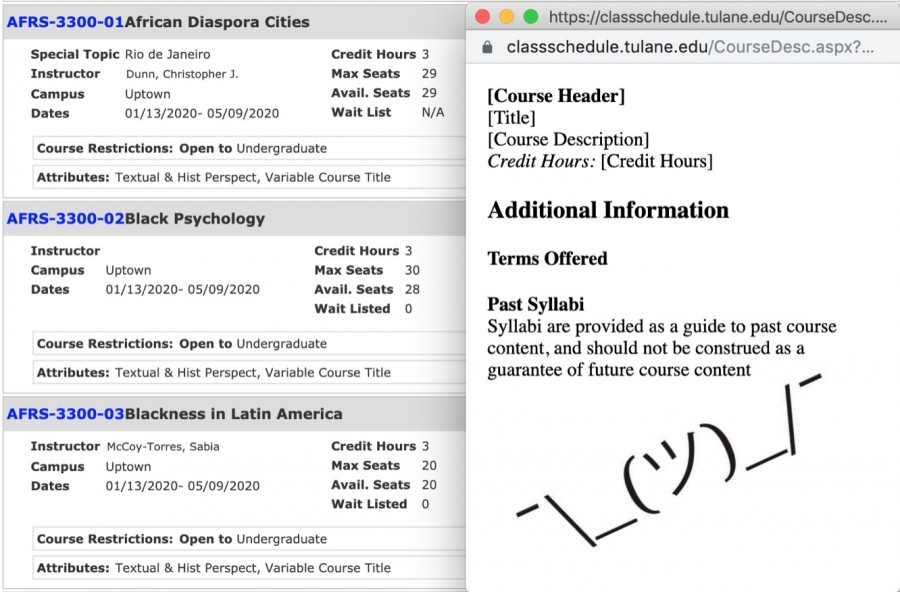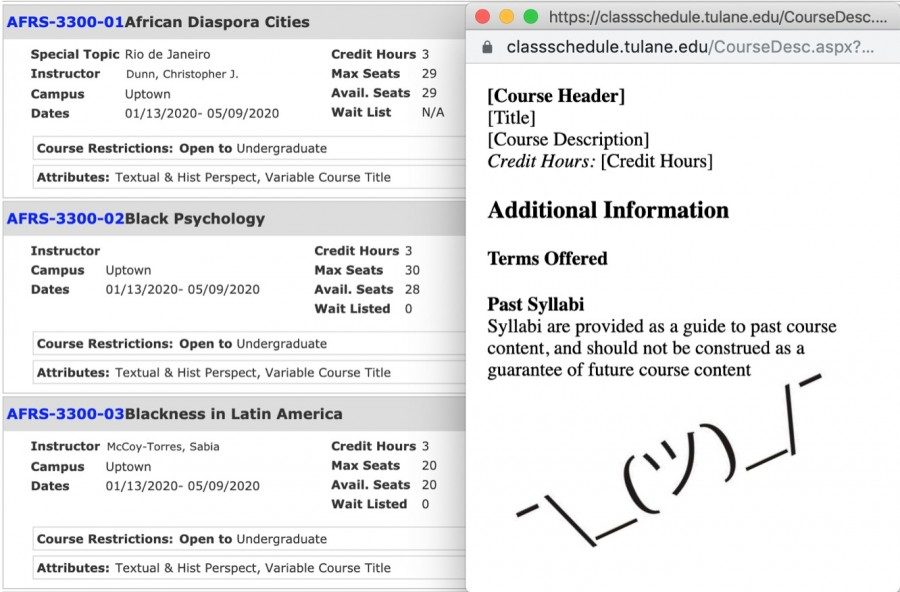Without syllabi, course registration becomes a guessing game
November 6, 2019
As time tickets are assigned and degree audits are fretfully consulted, November marks the beginning of spring course registration. Sadly, at Tulane, our system represents a disappointing academic reality where laziness is favored and learning discouraged.
If course registration were intended as a period of intellectual excitement and engagement, then our Office of Academic Affairs would provide syllabi in advance for all listed classes.
The suggestion is not implausible.
Many of our peer institutions provide information about their course offerings. In 2012, Rice University’s Faculty Senate called for a new requirement where instructors must distribute and archive course syllabi. New York University, Rutgers University and myriad other schools do the same — either departmentally or school-wide.
The ask is simple and does not require any additional work on behalf of professors but merely a simple task of digitization. Courses taught year after year already have syllabi and should be archived. New courses require a syllabus or some sort of detailed description to be approved – these syllabi or descriptions should be presented to the students who might take the class and not just departmental administrators.

Our system currently asks students to look at a course’s title and brief description to make a decision about enrollment. These descriptions are sparse and often omit information about subject matter, scope and workload.
In the past, especially in Liberal Arts departments, many vaguely titled courses did not even have a course description for students to read. The school has made an admirable effort to fill this gap, but it must take a step further and provide a full sketch of each class through archived syllabi.
From the beginning of classes, students have 11 days to add additional classes.
An average student might shrewdly add more classes than they intend to take, even asking their advisor to waive the maximum allowance for credits. This student then must attend a handful of classes to obtain syllabi and decide whether the substance and course-load are a good fit. If prospective classes overlap, then students practice a juggling act, rotating in and out of classes in these first weeks of registration, grabbing syllabi and listening to course introductions.
This manifests as a precarious and chaotic start to the semester where students cannot solidify their schedules, purchase textbooks and settle into a routine until they spend two weeks in a needless game of pick-up-the-syllabus.
How can students decide whether to take a course if they don’t know what it entails? Why should a student be forced to run around campus, trying to negotiate the ideal schedule with the right amount of stimulating scholastic material, when our university is so unwilling to meet halfway and show it cares about a student’s academic engagement?
Students, expectedly, look for shortcuts and trade recommendations about easy-A-professors or low-involvement-courses. Forcing students to render these preferential verdicts on the basis of such meager information promotes a culture of academic disengagement.
With such little course information available, how can we be surprised that apathy guides these decisions?
November could represent a time in the academic calendar where students become excited about the coming semester, eagerly chatting about the fascinating courses they’ve signed up for and trading recommendations with like-minded peers.
With syllabi provided ahead of time, we could change our academic culture from one in which students collect major requirements and count down the hours in each course, to one where students look forward to class and spend time each week thinking about what they’ve learned.
Tulane’s caliber of instruction and quality of staff represent a vast terrain of unlimited opportunity. Without adequate information, students are made to wander in the dark, unable to properly navigate a challenging but bountiful landscape of academic life.























darrah bach • Nov 11, 2019 at 10:23 pm
well it probably also takes 2 minutes for them to upload the syllabus to course registration and then everyone could access it
student • Nov 8, 2019 at 12:29 pm
just email the professor or department and ask for the syllabus, it takes like 2 minutes